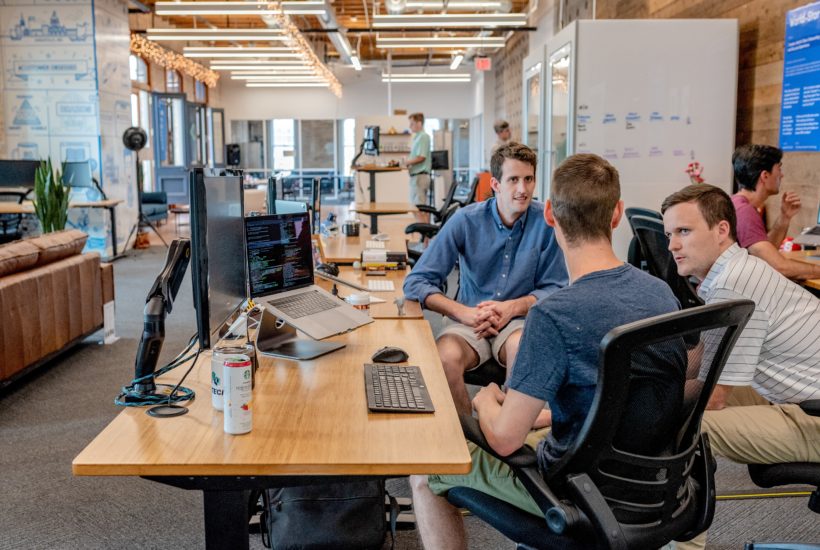Crowdfunding
Munich leads the way in German crowdfunding
More crowdfunding projects are appearing in Munich, Germany. There are companies who work in the field of start-ups, cultural and creative industries. They see crowdfunding not only as an alternative and innovative form of financing but also as an attractive opportunity to test new products, services, and ideas. It also allows them to receive direct feedback from customers and supporters.

In Munich, Germany, city administration and business are networking to support this form of financing. Munich is a nationwide role model in the field of crowdfunding – because various municipal and private-sector players have networked in the Bavarian capital to promote the financing of projects by collecting small amounts of money. Now they want to serve as a model for other cities. Crowdfunding allows a project to leverage many small financiers to get a project off the ground.
Susanne Mitterer, Deputy Head of the Competence Team for Cultural and Creative Industries at the City of Munich, explained the fundamental advantage of this type of financing: “As a provider, you can communicate directly with your target group and test the product on the market to see if it goes down well.”
Get the latest crowdfunding market news today along with other crucial business headlines with the Born2Invest mobile app! Receive the top-rated stock market news straight to your phone every day.
The city council and municipal pilot projects
Alexander Schmidbauer from the Foundation Department at the Department of Economics and Labour of the state capital supervised a municipal pilot project, which ran from 2018 to 2019. 43 campaigns were supported during this period, Schmidbauer reports. There was a maximum of $3.241 (€3.000) for each interested party, “but every euro we provided was matched by $1.6 (€1.5).” Following an evaluation, the city council has now extended the project by five years.
Start-up advisor Nikola Nikolic from Münchner Stadtsparkasse has been on this path for some time now; the bank has been supporting crowdfunding since 1993. “The time when the bank advisor alone decided what would be a promising project is definitely over,” Nikolic is convinced.
Georg Röß, in turn, works as a representative for technology and innovation at the Chamber of Crafts for Munich and Upper Bavaria (HWK). His position, as well as that of his four colleagues, is financed by the Federal Ministry of Economics and Technology; nationwide there are about 100. Röß sees his task primarily in scouting and innovation consulting. Crowdfunding is well suited for craftsmen, among other things, “because they can quickly implement prototypes.
Great cooperation of supporters in Munich
Munich is special because project supporters are in regular contact with each other and want to promote together, not individually. No other German city has had such close cooperation before. They advise screen projects and take care of qualifications.
The consultants can give some examples of successful crowdfunding. Above all Giesinger Bräu. They wanted to drill a 140-meter deep well. Because only breweries that extract their water in this way – tap water is not enough – are allowed to call their product Munich beer and thus receive basic permission to serve the barley juice at the Oktoberfest.
Crowdfunding projects and funding
The Giesingers lacked $864.320 (€800.000) to drill their deep well. Brewery boss Steffen Marx had 1.2 million beer mats made of felt distributed to the city’s mailboxes with the promise of 6% interest. The interest is available in the form of beer and food at the headquarters in Martin-Luther-Straße 2 in Giesing. The excavation project is to begin in April of this year.
Another interesting project was Chocolat hoch3. With his start-up, the trained master confectioner Benedikt Daschner wants to push forward the commercial chocolate 3D printing of logo, lettering, and other artwork. Daschner collected around $27.000 (€25.000) through Crowdfunding. The Green Style company, in turn, has committed itself to the principle of zero waste fashion – in other words, that fashion can be produced without the generation of waste.
Together, the experts recommend that the founders must inspire people and pursue the idea themselves with all their hearts. “Who am I and why am I doing this?” Every available stage – trade fairs, social media, etc. – should be used. Many small tasks would often be underestimated – such as creating mailing lists. “The crowd must be part of the story you tell,” Schmidbauer advised the founders. “Just put a cool movie on your own website – that won’t work.”
And what are the worst mistakes you can make in crowdfunding? Here, too, there is broad agreement between the consultants: the first thing is a miscalculation of project costs, followed by possible problems with the technical implementation. “Fans can quickly turn into enemies,” warned HWK representative Röß.
__
(Featured image by Austin Distel via Unsplash)
DISCLAIMER: This article was written by a third party contributor and does not reflect the opinion of Born2Invest, its management, staff or its associates. Please review our disclaimer for more information.
This article may include forward-looking statements. These forward-looking statements generally are identified by the words “believe,” “project,” “estimate,” “become,” “plan,” “will,” and similar expressions. These forward-looking statements involve known and unknown risks as well as uncertainties, including those discussed in the following cautionary statements and elsewhere in this article and on this site. Although the Company may believe that its expectations are based on reasonable assumptions, the actual results that the Company may achieve may differ materially from any forward-looking statements, which reflect the opinions of the management of the Company only as of the date hereof. Additionally, please make sure to read these important disclosures.
First published in DONAUKURIER, a third-party contributor translated and adapted the article from the original. In case of discrepancy, the original will prevail.
Although we made reasonable efforts to provide accurate translations, some parts may be incorrect. Born2Invest assumes no responsibility for errors, omissions or ambiguities in the translations provided on this website. Any person or entity relying on translated content does so at their own risk. Born2Invest is not responsible for losses caused by such reliance on the accuracy or reliability of translated information. If you wish to report an error or inaccuracy in the translation, we encourage you to contact us.

-

 Markets2 weeks ago
Markets2 weeks agoNavigating the Fourth Turning: Cycles of Crisis and Opportunity
-

 Cannabis4 days ago
Cannabis4 days agoIs Aurora Cannabis Stock a Risk Worth Taking?
-

 Impact Investing2 weeks ago
Impact Investing2 weeks agoEU Eases CO2 Tax Burden on SMEs with Revised CBAM Rules
-

 Business6 days ago
Business6 days agoAmerica’s Debt Spiral: A $67 Trillion Reckoning Looms by 2035

























